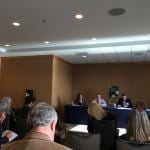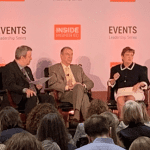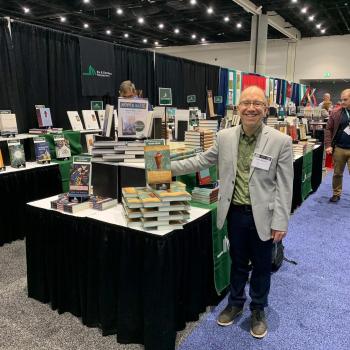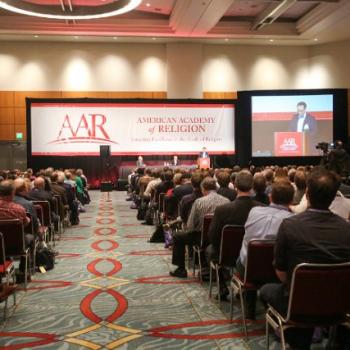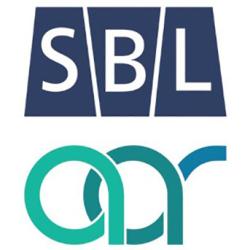The next speaker at the Interfaith/Interreligious Studies and Vocation workshop was Jacqueline Bussie, who said that her institution has an interfaith peacebuilding center with a name that does not immediately convey what they do. They developed an Interfaith Studies minor at Concordia, an ELCA school that was once predominantly Lutheran, but now is much more diverse, as their context has changed dramatically.
Institutional vocation questions should also be asked, and not only individual ones: What does it mean to be a Christian institution in a multifaith context? How do we meet needs of diverse students? How do we feel about our heritage – are we ashamed of it or do we embrace it? The language Concordia came up with was adopted by all 26 ECLA schools. They aim to offer education that is clear, accessible, rooted, and open. Bussie talked about “Diversity Equity and Inclusion” initiatives, saying that neglect of religious diversity is pedagogical negligence. Eboo Patel quoted Diana Eck who once said students graduate from high school knowing how to dissect a frog yet while knowing nothing about religion of 1.6 billion people. She often asks students: Would you rather have a nurse who understands your religious tradition or one who does not? Religious literacy is essential in our time. The subject is not taboo at Concordia, but a required course. They also developed a minor focused on interreligious literacy. They gathered a committee of interdisciplinary faculty and students, syllabuses were submitted, and courses had to meet 3 of 6 possible SLOs to be admitted into the minor, sometimes with modifications being requested before that happened. This is now one of their fastest growing minors (there are 12+ majors and 30 minors). Law schools require one page diversity statements from applicants. One of their students won a full scholarship by connecting interreligious studies with her law school vocation. One of their SLOs mentions vocation: “articulate a personal theology or philosophy of interfaith…” (SLO#6)
Noah Silverman represented the Interfaith Youth Core which has funded a lot of work and development of new programs in this area. The notion of calling (by God) comes out of one tradition. But what does it mean to be called by each other, by one’s interfaith interlocutors? What is your responsibility to those with whom you engage in interfaith dialogue? Can “calling” be expanded in this way and become more relevant and intelligible in our context of religious diversity? Young people are being called by a million different things. Our time is very different from the pre-modern era, with a far more diffuse range of paths. Students have the Netflix problem, paralyzing abundance of choice, leading us to spend a long time arguing about what to watch, or which way to go when it comes to career and life trajectories. How do you find your path among all the paths available? Silverman suggested faculty provide an example of how we make sense of our own path by telling a story of how we got where we are. Recognize that your story is not just your own but one of relationships. We’re all constituted by interaction with others who are religiously different from us in some way. Parents, pastors, coaches, teachers see a capacity for something in us that we may not. They are at least somewhat different from us, and so there is an interfaith element to that too, even if they are part of the same broad tradition. He also mentioned that discussions of vocation are white privileged discourses to a large extent. Who has the time and space in their life to ponder these matters, whether in vocational or interfaith terms? (See the issue of Intersections that tackles this subject). He also mentioned an occasion when you could count the number of white men in a counterprotest against a white supremacist rally on campus on one hand. How do we get groups that do not feel this is their issue or fight to become involved and invested? The key is creating understanding across difference and recognizing historic power structures.
The discussion during the Q&A got into a lot of fascinating detail. The Concordia minor is all about intersectionality, and so is about religion even in courses about race and power, or philosophy of feminism. Someone asked what to do when white Evangelicals say they feel marginalized and others say they have no right to? It is their experience. Some think we can and should create a useful fiction of interfaith space as neutral in its construction, each bringing their experience to a level playing field of non-judgment. This seems to suggest that there is important usefulness both to acknowledging situatedness and to striving for neutrality/objectivity. Someone else noted that 95% of Latino/Latina people reject the term “Latinx.” It is problematic if Christians get to define vocation as normal and other traditions have to go seek their equivalent. Even attempts at being inclusive can marginalize, and attempts at dominance can offend in different ways. Silverman said he is offended when people aren’t trying to convert him, if they genuinely believe that is essential to saving his soul. Someone also asked what the role of the career center is in this. There is lots of flux at present, with attempts at integration of career services and faculty advising, moving it from co-curricular to curricular. For Catholic students, vocation can mean going into the priesthood. Discernment is a Christian term, but Younus Mirza said that he as a Muslim finds it helpful. One question I had is whether “decentering Christianity” and “decentering Christian privilege” are the same thing. Faculty understand themselves as central to the university, and the classroom. The British famously said they wanted to see books when they asked about Indian religion, and this changed not only British understanding but also influenced Hinduism itself. You can be rooted in your tradition and yet not be at the center. And one panelist suggested that, if you spend 15 years of your life building an institution, you deserve to be at the center more than someone who was hired by it last month.
How do we find balanced inclusivity, that healthy medium between gatekeepers and everything goes? If we pretend to decenter Christianity at a particular institution that is deeply and firmly rooted in Christianity, aren’t we just kidding ourselves? Identity can be an insiders’ question, and yet we can still be changed by conversation with others. A panelist from Occidental talked about trying to bring in Restorative Justice principles and practices. Theirs is a secular institution, where all religious students feel somewhat marginalized. “Welcoming” is a good start. But does a member of a minority end up a permanent guest even after serving and even representing the institution to outsiders?
John Barton asked the question: apart from institutions, what is central to interfaith work? What is rooted? Silverman responded: what is central is the notion of civic common space for engagement. He likes the image of a pot luck: everyone brings something and all feast. But we also eat in our own homes. Human relationship is also central. In his own theology, God exists in human relationships. This obligates us in certain ways, since from this perspective, interfaith is part of what it means to be human.
Jacqueline Bussie said what is central is mutual understanding and openness. Their Lutheran heritage provides an impetus for interfaith work. It fosters embrace of paradox, favoring of both/and thinking over either/or. Rabbi Abraham Heschel famously wrote about how to be loyal to tradition and open to other people. Mirza noted that many students think about life purpose as separate from career. There is a risk in reducing the definition of something like vocation to a least common denominator, watering it down so that it ceases to be robust. At Concordia students made the case to faculty for the need for Interreligious studies. Education students talked about not being prepared for religious diversity in their second grade classes. They articulated why they need these skills, this literacy. Being student-driven boosts enrollment in classes. It sells.
I felt when I attended it that this workshop was incredibly rich and rewarding, with great practical usefulness for curriculum and pedagogy. Turning my notes into blog posts, I feel that way all the more – and I am still only about halfway through! So stay tuned for more soon…


